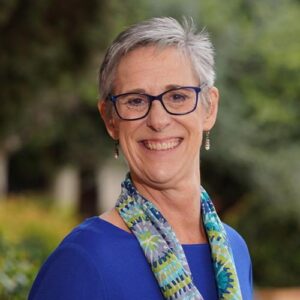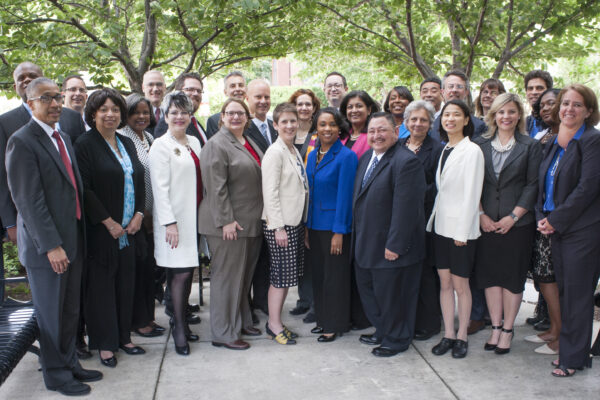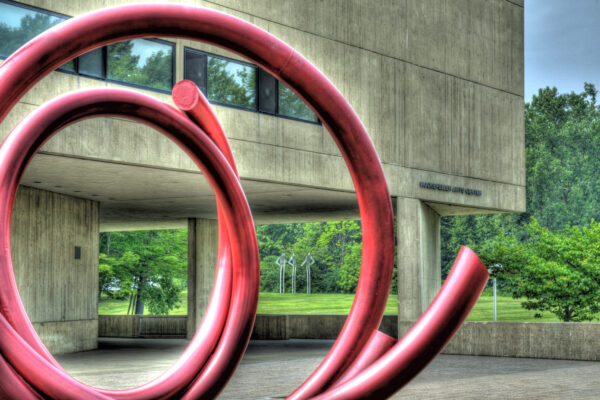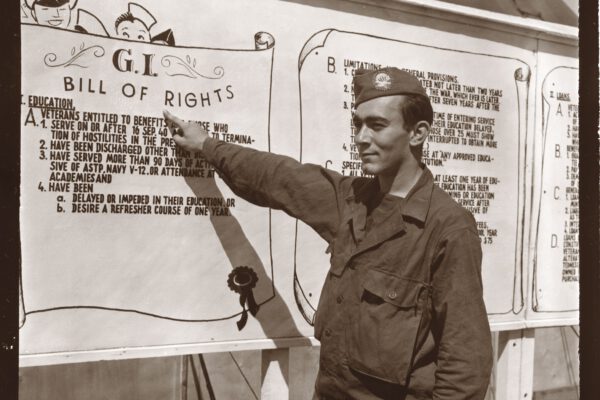By Sherri Lind Hughes
As the mid-year ACE Fellows Program retreat in San Diego came to a close on Jan. 9, the members of the 2016-17 Fellows class gathered at the front of the room and assembled in a circle. It had been an intense five days of engagement, learning and reflection. Current Fellow Rob Deemer, nominated by the State University of New York at Fredonia and spending his fellowship year at Baldwin Wallace University (OH), was charged with wrapping up the final session; he created an atmosphere of quiet contemplation as an intentional and stark contrast to the fast pace and boisterous interaction that had characterized the retreat.
The agenda covered topics that are critical for higher education leaders including diversity, equity and inclusion, fundraising and strategic communication. But the Fellows also had time to take a deep dive into authentic leadership and to share their successes, insights and frustrations from the first half of this year.
As we settled into the moment, Rob bore witness to the experience of the week—the joy of reunion, the frustration of unknowns in a case study, the exhilaration of successful fundraising and the vulnerability of fearing failure and rejection. He bore witness to the fellowship, the community of leaders who first gathered over 50 years ago in this nominator-driven, cohort-based, mentorship program to enhance their skills, expand their knowledge and work collectively to serve higher education.
 The strength of that fellowship and its ability to transform individuals and the institutions they lead is documented in a new report released by ACE. “Looking Back and Looking Forward: A Review of the ACE Fellows Program” chronicles the experiences of Fellows, mentors and nominators in the first 50 years of the program. The report’s findings and recommendations are based on national surveys, focus groups, and interviews with higher education leaders who have contributed to the program. It affirms both the reputation of the program as “the premier leadership program in higher education” and raises critical questions that will guide the program’s future.
The strength of that fellowship and its ability to transform individuals and the institutions they lead is documented in a new report released by ACE. “Looking Back and Looking Forward: A Review of the ACE Fellows Program” chronicles the experiences of Fellows, mentors and nominators in the first 50 years of the program. The report’s findings and recommendations are based on national surveys, focus groups, and interviews with higher education leaders who have contributed to the program. It affirms both the reputation of the program as “the premier leadership program in higher education” and raises critical questions that will guide the program’s future.
As a former member of the ACE Fellows Program and now the director of the program itself, I can testify to the power of this program to prepare leaders in higher education. Each year, a cohort of emerging leaders from colleges and universities around the country and the world is selected to participate in this unique and intensive leadership development program. Participants leave the familiarity of positions as faculty, staff or administrators on their home campuses to join the senior leaders at a host campus as they make decisions about the future and confront the challenges facing their institution. The report draws attention to how the program’s design promotes increased knowledge of higher education, a broader perspective on key issues facing institutions, and enhanced self-confidence that prepares participants for senior leadership positions.
Fellows often arrive at the annual opening retreat wanting to learn more about budgeting or enrollment management, eager to witness effective leadership in action, and hopeful that they will take a toolbox of best practices back to their home campus. Yet as the year goes by, they experience a transformation that comes not only from that new knowledge and wisdom, but also from the power of collaboration and teamwork, and the support, encouragement, and challenge of both peers and mentors. They are informed, prepared and resilient.
Through work with their mentors (typically the president or other senior leaders on their host campus) and their cohort, Fellows develop a broader perspective and both an understanding of and appreciation for the complexity of leadership in higher education. They can have “out of meeting experiences” as they observe deliberations with both the distance of an outsider and the access of an insider. They internalize the different values and priorities that they observe during the year and learn to put an issue on the table and walk around to see it from those different perspectives. Through case studies and shared projects, they learn to work in teams that share their talents and expertise and hold each other accountable for meeting the highest expectations.
With the increasing complexity and volatility of higher education, the ACE Fellows Program is poised to answer the call in this report for both a positional and collective approach to leadership development. For each cohort of Fellows, as the year goes by, they become a collective that celebrates success, offers solutions, and provides support in challenging times. They will take all of this back to their home campuses and carry it with them throughout their careers. They are the leaders that higher education needs as presidents, vice Presidents, deans, and faculty who can lean in to the challenges on their campuses and in their communities.
In its first 50 years the ACE Fellows Program has prepared over 1,900 leaders who have stepped into important roles and fulfilled critical responsibilities to serve higher education. As we look forward it is a program that individuals and institutions can depend on to ensure that we can successfully navigate the turbulent waters of the future. The bonds of the fellowship make all of us stronger and more resilient.
If you have any questions or comments about this blog post, please contact us.



